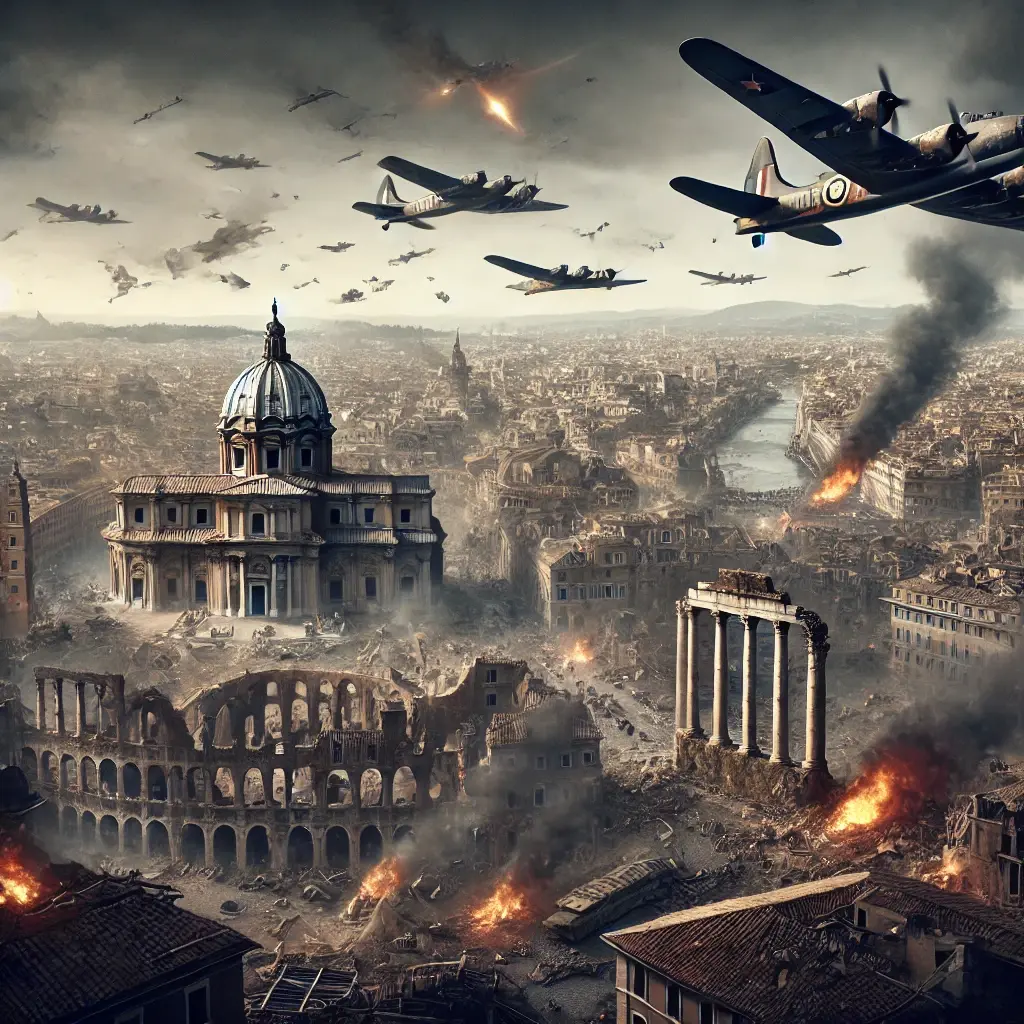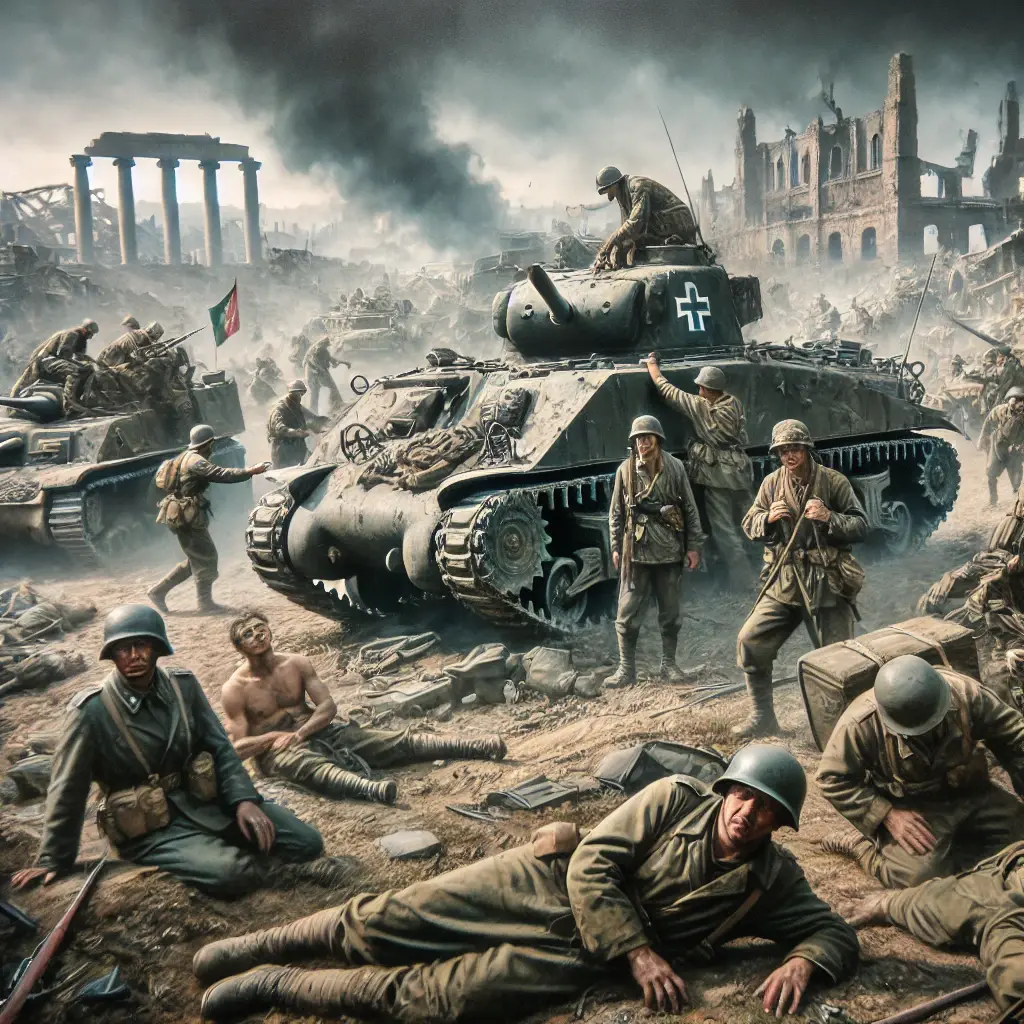On July 19, 1943, in one of the more controversial actions of World War II, Allied forces led by the United States conducted a bombing raid on Rome, targeting military and industrial locations within the then-fascist capital. This was the first of several raids aimed at crippling fascist infrastructure but spared some culturally and historically significant landmarks. The bombing was a significant psychological blow to Italian morale and contributed to the eventual downfall of Mussolini’s regime. It also raised ethical questions about the impact of warfare on historical cities and civilian populations, which continue to be debated today.

The bombing of Rome on July 19, 1943, marked a pivotal moment in World War II, highlighting the complexities and ethical dilemmas of modern warfare. The decision to target Rome, despite its rich historical and cultural heritage, was not made lightly. Allied forces were keenly aware of the potential backlash and the importance of preserving the city’s invaluable artifacts and monuments. Nonetheless, the strategic necessity of undermining Italy’s fascist regime took precedence, leading to a carefully planned operation that aimed to minimize collateral damage while achieving its military objectives.
Prior to the raid, Allied intelligence conducted extensive reconnaissance to identify key military and industrial targets within Rome. The primary objective was to disrupt the Axis powers’ war efforts by destroying factories, rail yards, and other infrastructure critical to Mussolini’s regime. Despite these precautions, the raid inevitably resulted in civilian casualties and damage to non-military structures, which sparked outrage and condemnation from various quarters, both during and after the war.
One of the most controversial aspects of the bombing was its impact on Rome’s civilian population. While the Allies sought to avoid unnecessary loss of life, the nature of aerial bombardment made it impossible to completely spare non-combatants. The raid resulted in significant civilian casualties, which fueled anti-Allied sentiment among the Italian populace and raised moral questions about the conduct of the war. These ethical considerations remain a topic of debate among historians and military scholars to this day.
The bombing also had a profound psychological effect on the Italian people. Rome, as the heart of the Italian nation and the seat of the Vatican, held immense symbolic importance. The attack on the city shattered the illusion of invulnerability that many Italians held and exposed the fragility of Mussolini’s regime. This psychological blow contributed to the erosion of public support for the fascist government and hastened its eventual collapse.
In the aftermath of the bombing, the Vatican played a crucial role in providing aid and comfort to the affected civilians. Pope Pius XII, who had been a vocal advocate for peace, used his position to call for an end to the hostilities and to provide assistance to those in need. The Vatican’s efforts to alleviate the suffering of the Roman population helped to maintain a semblance of stability and order in the city during a tumultuous period.
The raid on Rome also had significant military repercussions. By targeting key infrastructure and industrial sites, the Allies were able to disrupt the Axis supply lines and weaken Italy’s ability to sustain its war effort. The damage inflicted on Rome’s transportation network and industrial base hindered the movement of troops and supplies, thereby contributing to the broader strategic objectives of the Allied campaign in the Mediterranean.
Despite the immediate success of the bombing raid in terms of its military objectives, the long-term consequences of the attack were complex and multifaceted. The destruction of Rome’s infrastructure necessitated extensive post-war reconstruction efforts, which placed a heavy burden on the already strained resources of the Italian state. The rebuilding process also provided an opportunity for Italy to modernize its industrial base and transportation network, ultimately contributing to the country’s post-war economic recovery.
The ethical questions raised by the bombing of Rome have continued to resonate in discussions about the conduct of war. The raid highlighted the tension between military necessity and the preservation of cultural heritage, a dilemma that has persisted in subsequent conflicts. The experience of Rome has informed contemporary debates about the rules of engagement and the protection of civilian populations and cultural sites in wartime.
In addition to its immediate military and psychological impact, the bombing of Rome had far-reaching political implications. The raid exposed the weaknesses of Mussolini’s regime and emboldened resistance movements within Italy. The growing dissatisfaction with the fascist government culminated in the fall of Mussolini later that year, paving the way for Italy’s eventual surrender and realignment with the Allied powers.
The bombing also had a significant impact on international public opinion. News of the raid spread quickly, eliciting a range of reactions from around the world. While some viewed the attack as a necessary step in the fight against fascism, others condemned it as an act of cultural vandalism and a violation of the principles of civilized warfare. These divergent perspectives underscored the complexity of the conflict and the challenges of balancing military objectives with humanitarian considerations.
The legacy of the bombing of Rome has been preserved through numerous historical accounts, documentaries, and academic studies. Historians have meticulously documented the events of July 19, 1943, and have examined the broader context of the raid within the framework of World War II. These efforts have ensured that the lessons learned from the bombing continue to inform contemporary discussions about the ethics of warfare and the preservation of cultural heritage.

In commemorating the anniversary of the bombing, Rome has sought to honor the memory of those who perished and to reflect on the broader implications of the raid. Various memorials and commemorative events have been established to remember the victims and to educate future generations about the importance of protecting cultural heritage in times of conflict. These efforts have reinforced Rome’s identity as a city that, despite its turbulent history, remains a symbol of resilience and continuity.
The bombing of Rome serves as a poignant reminder of the devastating impact of war on both human lives and cultural treasures. It underscores the need for vigilance and foresight in the conduct of military operations and highlights the enduring importance of ethical considerations in times of conflict. As we reflect on the events of July 19, 1943, we are reminded of the imperative to strive for a world in which the horrors of war are mitigated and the values of humanity and cultural preservation are upheld.
